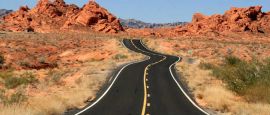Nevada History, Language and Culture
History of Nevada
Archaeological evidence suggests that the land we now know as Nevada was inhabited approximately 12,400 years ago, long before European settlers discovered the area. It wasn’t until the early 19th century when Spanish friar Francisco Garcés became the first European to explore the area, making his way up from New Mexico and recording the Native American tribes he encountered. By 1851 the first villages and towns were being founded by Mormons settlers on their way to work California’s gold fields. Ten years later, an Act of Congress established the Territory of Nevada, and President Abraham Lincoln appointed James W. Nye as its Territorial Governor. On October 31, 1964, President Lincoln granted Nevada statehood to the US as the 36th state. Nevada was the first state to give African American men the right to vote with the ratification of the 15th Amendment in 1869.
By this time, Nevada’s economy had hit the jackpot with the discovery of the Comstock Lode in 1859, prompting a silver rush and an influx of labourers looking to mine the precious metal. By 1882 over $300 million’s worth of silver had been mined from the lode.
In time Nevada’s economic stronghold became known as Las Vegas, meaning “the meadows” as named by the first European to encounter the valley in 1829. Las Vegas became connected to railroads in 1905 – bringing the city to life. During a period of gambling prohibition from 1909 to 1931, illegal speakeasies and casinos cropped up along with organised crime activity.
The construction of the nearby Hoover Dam led to the appearance of casinos along Fremont Street, and by 1946 the first luxury resort was built. The 1950s marked an era of new resorts funded by crime organisations; however, by the late 1960s legitimate corporations had begun to invest in Las Vegas. Over the past few decades, Las Vegas, especially The Strip, has been revamped with massive resorts and casinos due to high tourism rates.
Did you know?
• The state also holds notorious ties to the Cold War as over 100 nuclear bombs were tested at the Nevada Test Site, northwest of Las Vegas.
• Nevada comes from the Spanish term for snow-covered yet it is the driest state in the US and is mostly made up of desert and semi-arid regions.
Nevada Culture
In Nevada, the largest denominations are Roman Catholic, the Church of Jesus Christ of Latter-day Saints (Mormon) and the Southern Baptist Convention. As in other states, Protestant affiliation is broken down to mainline, evangelical and other branches. In Nevada, Protestant affiliation totals 35%, while Roman Catholic is at 25%.




 You know where
You know where